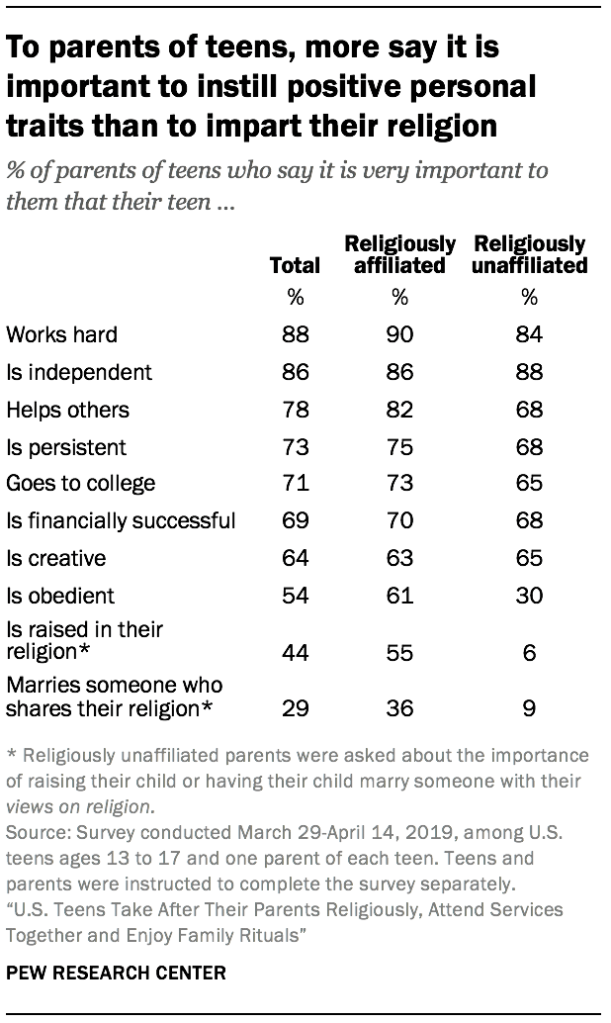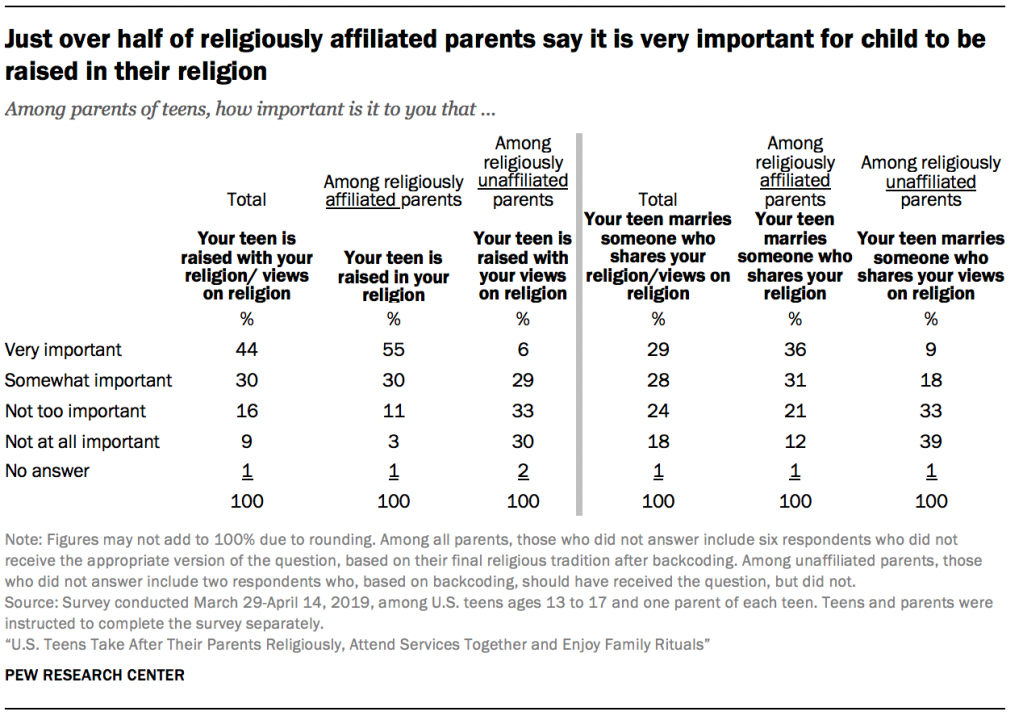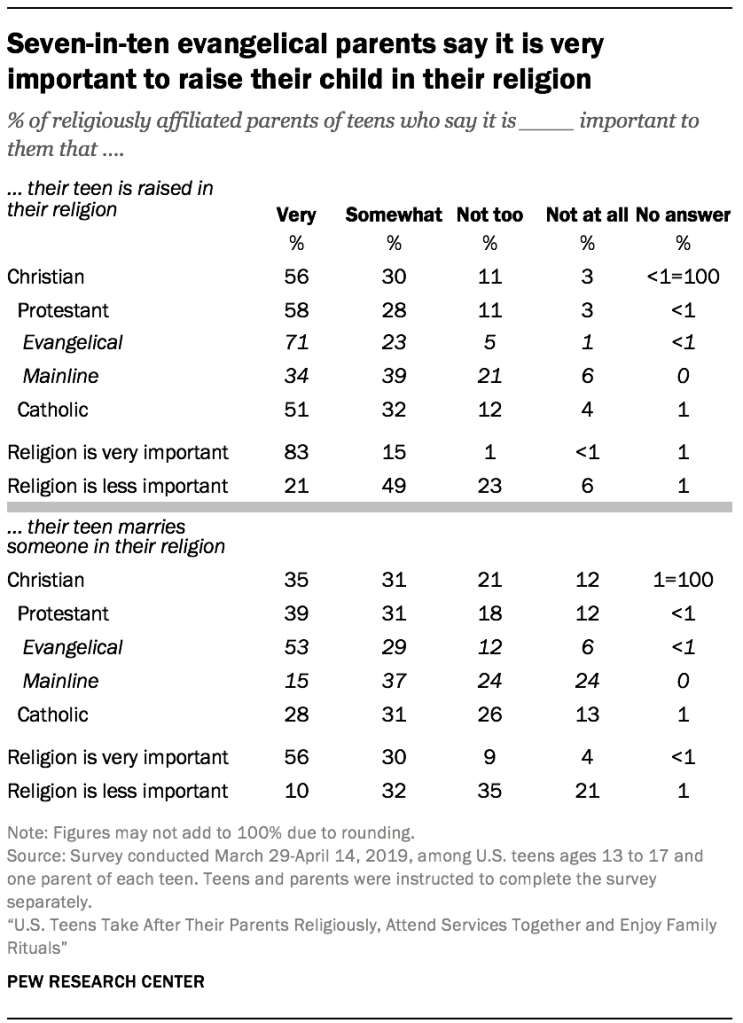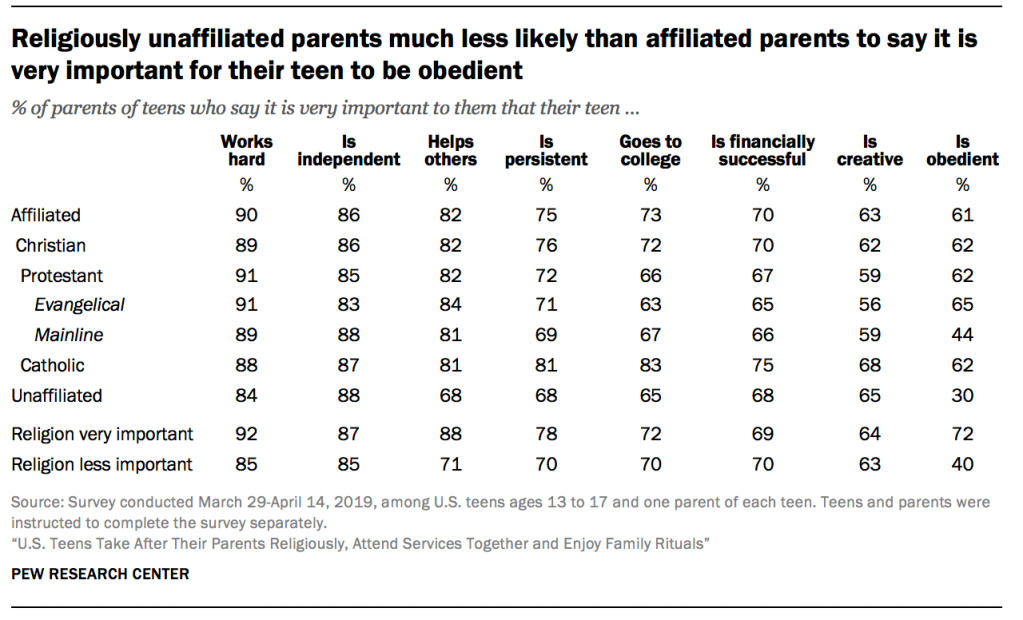The survey asked parents of teens ages 13 to 17 about some of their desires for their teen, including the importance of raising their teen in their own religion or with their own views on religion. Parents also were asked to assess how important it is for their teen to exhibit certain traits, such as being independent, creative or persistent, and reach certain goals, such as going to college or being financially successful.

Religiously affiliated parents are much more likely than religiously unaffiliated parents (those who say their religion is atheist, agnostic or “nothing in particular”) to say it is “very important” to them that their teen is raised in their religion or marries someone with their religion (or views on religion). Among unaffiliated parents, no more than about one-in-ten say these things are very important.
However, even affiliated parents generally consider these desires to be less important than their teen being financially successful or going to college, and they also are more likely to place high importance on their teen being hardworking, independent or helpful to others than they are to say it is very important that their teen is raised in their religion. For example, among religiously affiliated parents, 90% say it is very important to them that their teen works hard, 73% say it is very important that their child goes to college, and 55% say it is very important that their teen is raised in their religion.
Among all parents of teens, nine-in-ten or more say each of these traits is at least “somewhat” important for their teen to have – with the exception of the two questions about religion. A substantial minority of parents say it is “not too” or “not at all” important for their child to be raised with their religious beliefs or views on religion (26%), and even more say the same about their child marrying someone from their religious group (42%).
The survey asked religiously affiliated parents of teens how important it is to them to raise their child in their religion, while religiously unaffiliated parents were asked about the importance of raising their child with their views on religion. Another question used similar phrasing: How important is it for your teen to marry someone who shares your religion (for affiliated parents), or someone who shares your views on religion (for unaffiliated parents)?
Most religiously unaffiliated parents say these things are “not too” or “not at all” important to them. About six-in-ten in this group say raising their child with their views on religion is “not too” (33%) or “not at all” (30%) important to them, and seven-in-ten (33% and 39%, respectively) say the same about their teen eventually marrying someone with their views on religion.
By contrast, slightly more than half of religiously affiliated parents (55%) say it is “very important” to raise their child in their religion, and another three-in-ten say this is “somewhat important.” Affiliated parents do not feel as strongly about the religion of a possible future spouse for their teen, but still, most say it is very (36%) or somewhat (31%) important to them that their teen marry within their faith.

Parents who identify as evangelical Protestants are most likely to say it is very important to them to raise their child in their religion. About seven-in-ten (71%) in this group hold this view, compared with about half as many mainline Protestants who say the same (34%). Among Catholic parents, about half (51%) say it is very important to them to raise their child as a Catholic.

There is a similar pattern on the question about who their child may someday marry. About half (53%) of evangelical Protestant parents say it is very important to them that their 13- to 17-year-old child eventually marries someone who shares their religion, compared with 28% of Catholic parents and 15% of mainline Protestant parents who say the same.
Among parents who are affiliated with a religion, those who say religion is very important in their own lives are much more likely than parents who place less importance on religion to prioritize raising their child in their own religion or seeing their child marry within their faith. For instance, 83% of religiously affiliated parents who say religion is very important to them personally also say it is very important to raise their child in their religious faith. Among affiliated parents who consider religion less important, just 21% say it is of paramount importance to raise their child in their religion.
What do parents from different religious groups want for their teens?
Religiously affiliated parents and religious “nones” hold similar opinions about the importance of their child becoming financially successful. Within the Christian groups analyzed, however, Catholic parents are more likely than Protestant parents to say financial success is very important (75% vs. 67%). Similarly, Catholics are more likely than Protestants to say it is very important that their child goes to college (83% vs. 66%). On this question, religiously unaffiliated parents are less likely than parents who identify with a religion to prioritize their child going to college: 65% of unaffiliated parents say this is very important, compared with 73% of religiously affiliated parents.
There is widespread consensus among parents of different religious groups that it is crucial that their teens are hardworking and independent. And while religiously unaffiliated parents are somewhat less likely than parents who belong to a religious faith to say it is very important for their teens to help others and be persistent, majorities among both groups hold these views. For example, about eight-in-ten religiously affiliated parents think it is very important for their teen to help others, compared with 68% of religiously unaffiliated parents who say this.
But a much bigger gap exists on the question of obedience: Religiously affiliated parents are twice as likely as unaffiliated parents to say it is very important for their teen to be obedient (61% vs. 30%). Among Protestants, evangelical parents are much more likely than mainline Protestant parents to say this (65% vs. 44%).





